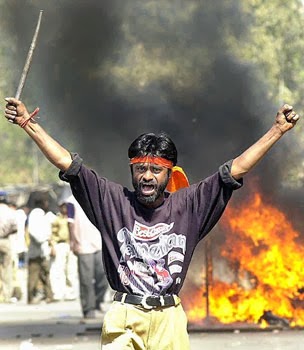Enemies and Allies
 |
| Ansari, 2002 |
Many of us may recall the
terrified face of Qutubuddin Ansari. It
was one of the most widely circulated pictures in the days that followed the
Gujarat riots of 2002. It showed terror,
helplessness, and the obstinate persistence of the survival instinct. Ansari left Gujarat and settled down in West
Bengal after the riots.
If Ansari was one of the
preys, Ashok Mochi was one of the predators. The picture of the Bajrang Dal
activist was as popular as Ansari’s in those days. This picture showed the other face of the
riots: the diabolic dimension of fanaticism.
Two days back both Ansari
and Mochi shared the same platform in Kerala.
The occasion was a seminar on genocide organised in Kannur by certain
cultural organisations associated with CPI(M).
 |
| Ashok Mochi, 2002 |
Ashok Mochi told the
audience that he never voted after the nefarious role he played in the Gujarat
riots. He realised the severity of his
crimes and repented what he did. He continued
to live as a poor man in the same street of Gujarat in spite of the much
vaunted development brought to the state by Mr Narendra Modi.
Ansari thanked the people
of Kerala for bringing together two persons who would not be allowed to be
together in their own home state. He
said that Ashok Mochi was also a victim of the riot in the sense that his
poverty was exploited by the political manipulators of the riot.
History, memory and
religion – these can be mobilised in whichever way a leader wishes. They can be manipulated for nefarious purposes
as is done in communal riots. They can
also be mobilised for forging better relationships among communities. It all depends on what the leader wants to
achieve.
 |
| Mochi & Ansari, 2014 |
Kudos... :)
ReplyDeleteHope springs eternal in the human breast, said Alexander Pope :)
DeleteThe attempt by the Kannur cultural club in Kerala should not go unnoticed. At the same time, it shouldn't be a play of political activism for the sake of the election. It should be an ongoing process. Many Mochis and many Ansaris should come together and realize who mold the mobs to commit gory acts.
ReplyDeleteThere may be some politics in this. But politics or not, it reveals something significant... There is no ideology behind riots
DeleteWhat a beautiful post by you ... in an India torn by fresh waves of hatred, we need some sensibility like this. I just need to share it everywhere I can ..
ReplyDeleteThanks, Puru.
DeleteA well timed post.
ReplyDeletePeople realize the mistakes once its done. Ansari and Mochi are the victims of the political manipulation game. Politicians use common man as and when needed and common people realize the mistakes once they are ignored by these politicians.
Not to forget the good intention of that club who brought these guys together on a single platform. But I can feel the sense of political manipulation especially when its backed by CPI(M)? I am not questioning the intention of these clubs, if they are doing it for a good cause, fine we all support them. But if this is an election gimmick, let them know that we are not Aam Aadmi anymore!
As I said in a comment above, even if the seminar was politically motivated it still has much to teach us. ..
DeleteEvery thing changes over time and this is a good example. I hope many more positive changes will be there in the future.
ReplyDeleteDo you think today's political scenario gives us much room for hope?
DeleteWhen it comes to this kind of issues, I'm a cynic. As long as humans live, there's going to be politics. It's human nature. And until politics exists, each and every one of us are going to be manipulated or politicians will die doing that!
ReplyDeleteThe cynic in me is also quite strong, Pankti. I was aware of the politics behind this union... But the individuals concerned are genuine: they wouldn't want the kind of communalism they perpetrated or suffered...
Delete